Unique Chilbulam Hermitage:
Seven Stone-Carved Images
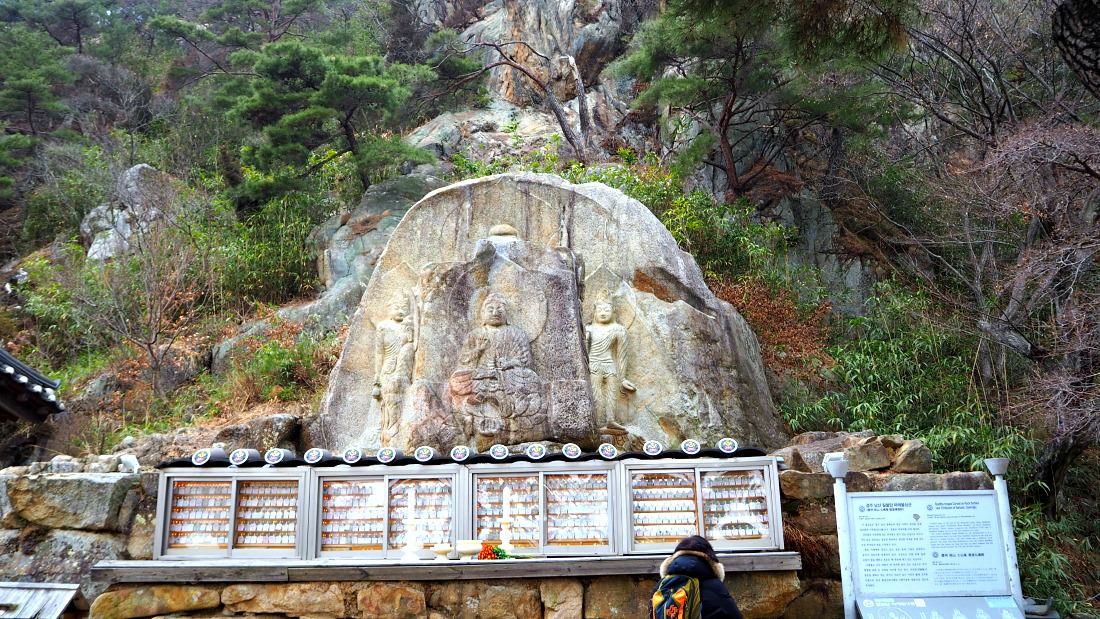 Seven Stone-Carved Buddhas Images
Seven Stone-Carved Buddhas ImagesIntroduction
Enshrined in the heart of Gyeongju City, South Korea, lies the tranquil haven of Chilbulam Hermitage.
Nestled in the verdant embrace of Tohamsan Mountain, this Buddhist retreat captures the soul with its serenity and spiritual allure, offering an intimate peek into Korea's deep-rooted Buddhist culture.
Chilbulam, meaning 'Seven Buddhas Hermitage', is renowned for its unique ensemble of seven stone statues of Buddha, each exuding a timeless tranquility. Carved into the rocky cliffs during the Unified Silla Period, these statues are more than mere artistry; they encapsulate centuries of devotion, humility, and spiritual pursuit.
As you venture into this secluded hermitage, the surrounding natural beauty complements the spiritual atmosphere. The whispers of the wind through the trees, the chorus of birds, and the soothing murmur of a nearby stream imbue the place with an ethereal calm.
Adjacent to Chilbulam, the Yongjangsa Temple Site adds a layer of historical richness, with remnants of pagodas and temple stones telling tales of the ancient Silla era.
Visit Chilbulam Hermitage for a spiritual retreat, an enchanting journey into Korea's Buddhist tradition, and a tranquil immersion in nature's splendor. Experience the tranquility that transcends time at Chilbulam Hermitage.
chilbulam hermitage site
Chilbulam Hermitage is located in the lush but rocky side of Namsan Mountain in Gyeongju City, Gyeongsanbuk-do.
It is a temple area with famous granite stone-carved images of Buddha (and bodhisattvas). The are beautiful work of art given that they are old. The artist must have used crude tools to chisel out and create these images.
Although I am not a believer, I like Buddhism beliefs and philosophy. And it is because of this religious art and symbolism that I traveled this far.
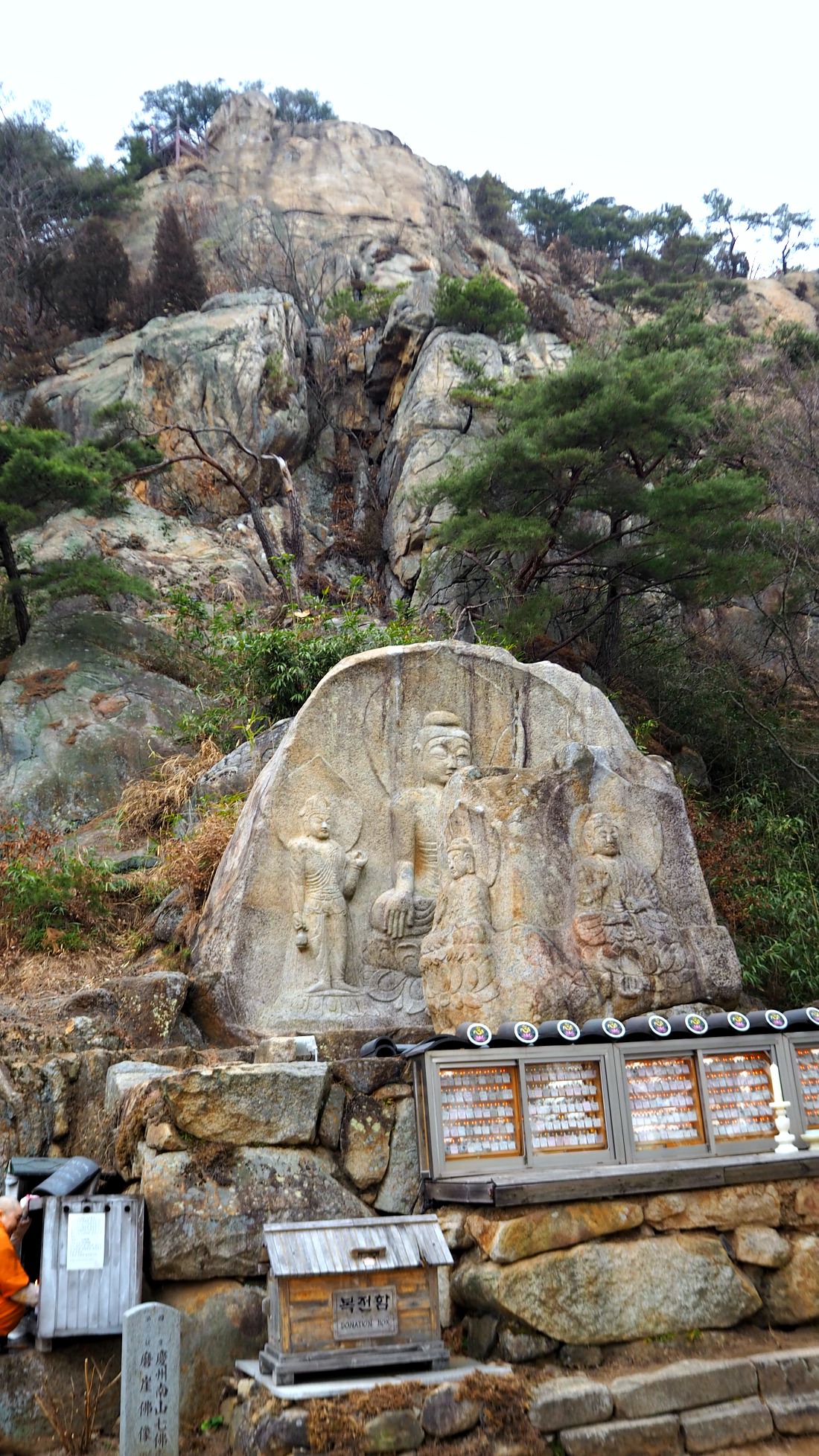 This photo shows the ledge above the images where the solo Bodhisattva is located.
This photo shows the ledge above the images where the solo Bodhisattva is located.Looking at my map, I decided to look for the ‘Seokgayeorae Buddha’
stone-carved image. I tried to explain and asked where this is to the
man who was inside a guardhouse. He mentioned that I need to go to
Chilbulam and I can find what I’m looking for.
I thought
Chilbulam is just a famous destination. I decided anyway to get there
and find out.
To my surprise, I got what I was looking for: Chilbulam Hermitage is
exactly one of the Buddha (and bodhisattvas) sculpture sites that dot the
Namsan Mountains in Gyeongju.
It is not the one I originally planned to see, as specified in the map, but very glad to have found it.
brief background
Located on the steep cliff of Namsan Mountain, you will find the Chilbulam Hermitage courtyard with the main hall and a Samseong-gak shaman shrine hall.
A Buddhist nun was cleaning up the candles beside the Chilbulam sculptures when I arrived. When she saw me, she invited me to drink tea with other guests inside the hall, which I gently refused since I don’t have much time and I have coffee with me.
I did not have time to go to investigate the shrine hall, but Dale of The Korean Temples mentioned three paintings of the three shaman deities inside it.
There is also a seated image of Sanshin, the Mountain God (Spirit) he mentioned (I should check it out next time around!).
 Main Hall at Chilbulam Temple Site
Main Hall at Chilbulam Temple SiteSo, I did not waste time to pull out my camera and started taking photos which much excitement. I was overwhelmed with a feeling like I have discovered a hidden treasure.
Feeling satisfied that I got some useful shots, I proceeded to take the narrow trail that leads to the other image higher up the mountain.
But first, let me show you the photos with descriptions of the “Seven Buddhas on a Rock Face” (translation for ‘chilbulam’).
Seven Buddhas on a Rock Face (Chilbulam)
This sculpture dates back to sometime between the 7-8th century. In Korean language, the sculpture is called “Chilbul Maae Seokbul.” It means that there are seven images of Buddhas and bodhisattvas, in total, that are visible in two separate granite stones.
Four of them are sculpted on the smaller rock that is standing in front of a much bigger rock. On the face on the bigger rock, you will find three Buddha and Bodhisattva carvings.
Among the three, the tallest one is about 2.7 meters in height. This image seems to be the Amita-bul (The Buddha of the Western Paradise).
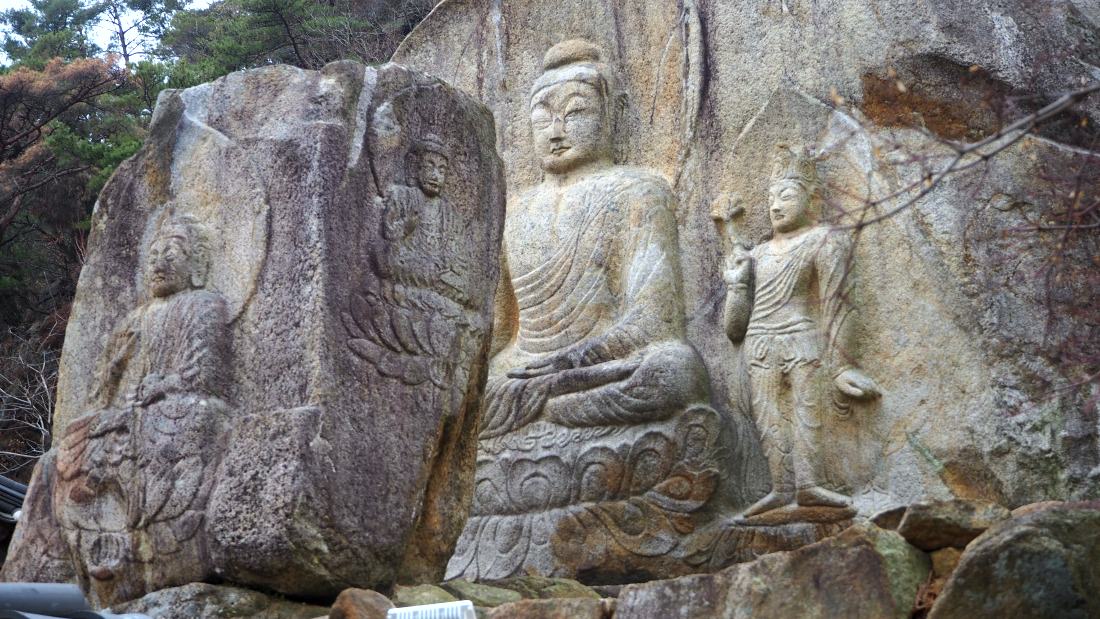 Amita-bul (tallest image) and Gwanseeum-bosal (left side of Amita-bul)
Amita-bul (tallest image) and Gwanseeum-bosal (left side of Amita-bul)The image to the right of Amita-bul seems to be the image of Gwanseeum-bosal (The Bodhisattva of Compassion). It is identified to be so because of the bottle of sweet dew she is holding in her right hand.
The image to the left of Amita-bul is that of Daesaeji-bosal (The Bodhisattva of Wisdom and Power for Amita-bul).
On the smaller, somewhat rectangular shaped rock, are four sculpted images. Two of them can be identified through the directions they face. One of the two is facing the east—Yaksayore-bul (The Medicine Buddha and the Buddha of the Eastern Paradise).
While the Buddha facing the West is Amita-bul—the Buddha of the Western Paradise.
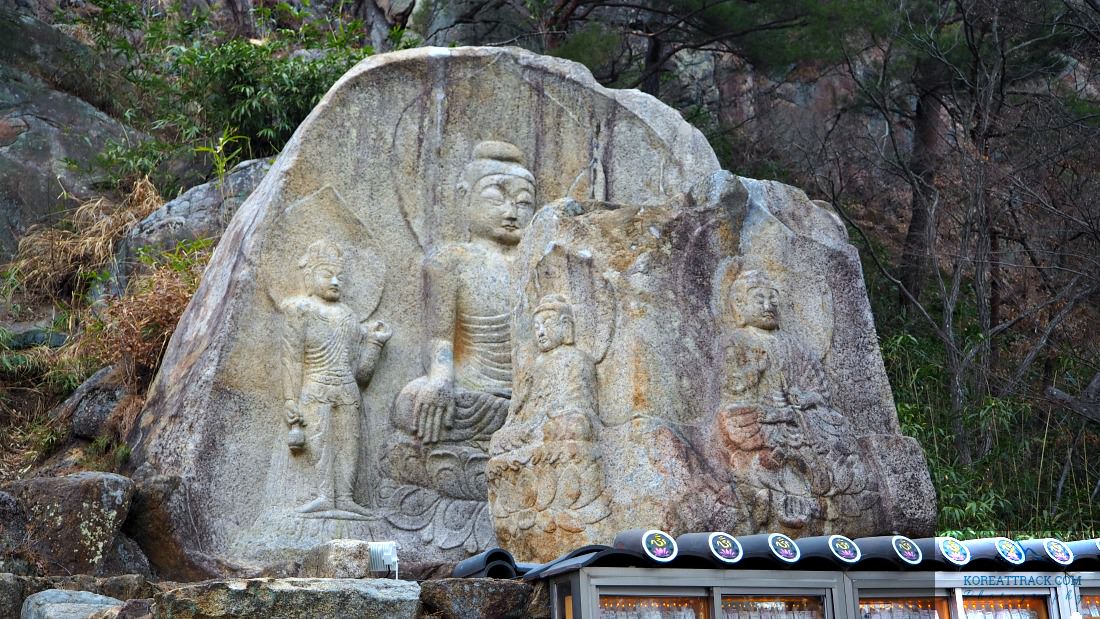 Daesaeji-Bosal (The Bodhisattva of Wisdom and Power for Amita-bul) - right side of Amita-bul
Daesaeji-Bosal (The Bodhisattva of Wisdom and Power for Amita-bul) - right side of Amita-bulSo, here is what I found after that shorter climb to the almost peak of Namsan Mountain in the area.
Reaching the top was a challenge to my left leg as I was walking all day including my treks to Bulguksa Temple and Seokguram Grotto.
Bodhisattva on the Rock Face in Sinseonam
I greeted two people who were coming back, I believe, from their visit to this Bodhisattva. They also responded respectfully saying “Annyonghaseyo”.
It was very quiet, and I carefully watch my steps while descending to the spot. I thought that I must be the only one by now at this time trying to see the Bodhisattva.
There it was…amazing! It was located just right above the Seven Buddhas below, and I could see the rooftop of the main hall and see where the Chilbulam hermitage images are situated from where I stood.
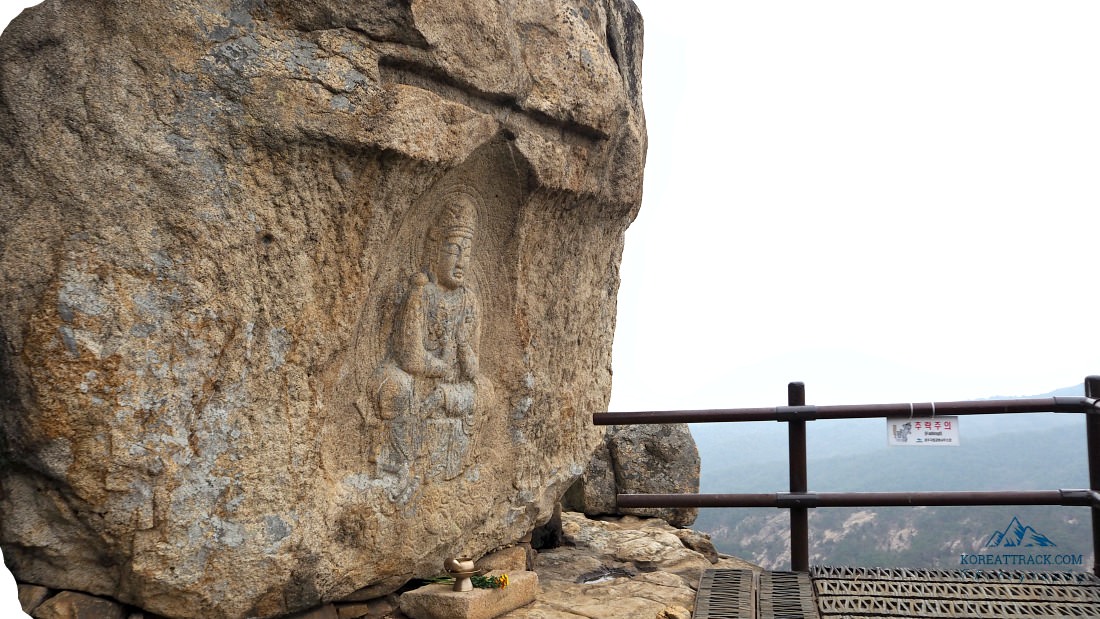 Image of Gwanseeum-bosal, the Bodhisattva of Compassion
Image of Gwanseeum-bosal, the Bodhisattva of CompassionI felt a sense of serenity when I looked at the ancient (about 8th century before) but calm image of Gwanseeum-bosal (The Bodhisattva of Compassion).
From the spot where I entered, you will see nothing but the rock and image and the expansive space and panorama of Gyeonju in the distance.
The sculpted image stands 1.4 meters in height. The Bodhisattva is wearing the three-sided bejeweled crown. It looks as if he is meditating while sitting on a cloud with his eyes seems close but partially open.
He seems to be watching the world above the clouds while holding a flower in his right hand and his left hand held up to his chest to symbolize something else.
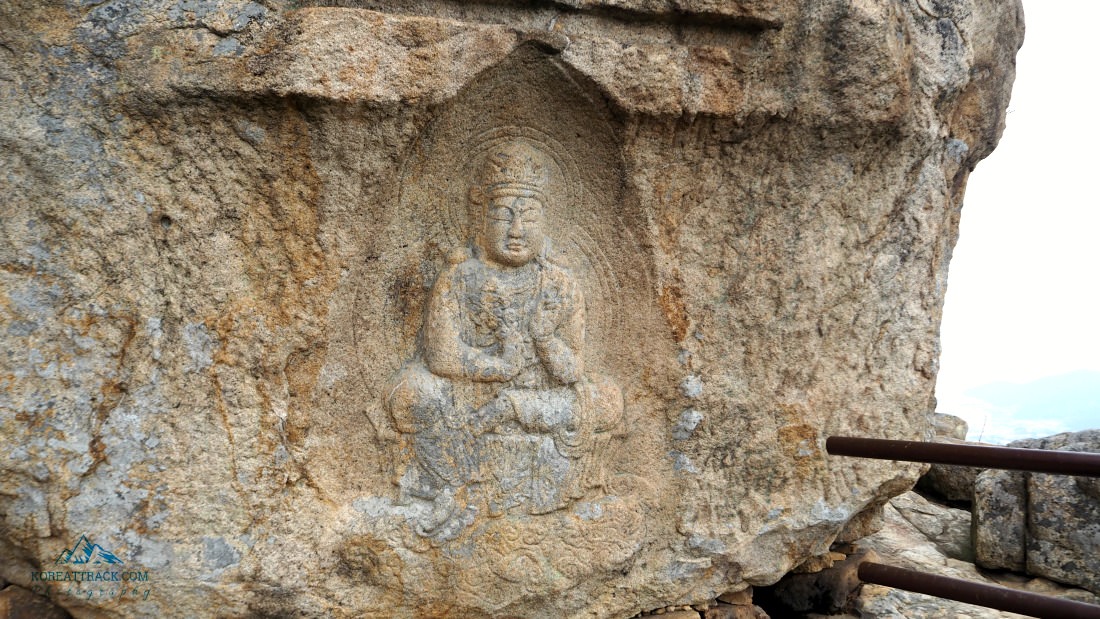 Closer view of Gwanseeum-bosal, Bodhisattva of Compassion
Closer view of Gwanseeum-bosal, Bodhisattva of CompassionGwanseeum-bosal is wearing thin clothing that reveals his body curvatures and flows down to the base of his pedestal. His (or her) left foot is tucked up under him while his right foot touched the ground.
Also, notice the mandorla (the halo in Buddhism, and it is also an aureola, or frame, which usually surrounds the figures in traditional Christian art).
The mandorla is consists of the ‘dugwang’ (light radiating from the head) and the ‘sigwang’ (light emanating from the body).
It is believed that The Bodhisattva of Compassion was created during the late 8th century of the Unified Silla Kingdom.
As I have not seen all (yet--that’s because I wanted to!), many say that this Bodhisattva sculpture is one of the “most uniquely and beautifully placed” piece of religious art in all of Korea.
who may visit?
Anybody can explore the Chilbulam Hermitage. It is not strictly limited to Buddhist believers only as it also belongs to the national park of Gyeongju.
Physically, a child who is seven years old that make it to the Hermitage (with an adult’s guidance at least). Actually, the main short challenge is the steep ascent from the drinking water spot, which is just around 20 meters to the hermitage courtyard.
Basically, the walk from the parking area up to the forested and rocky side of the mountain trail is fairly easy. A bit of challenge begins when you are about to take the last 500 meters before you reach the hermitage ground.
Ensure that you are wearing hiking boots or mountain trekking shoes as some parts are treacherous and have sharp rocks along the way.
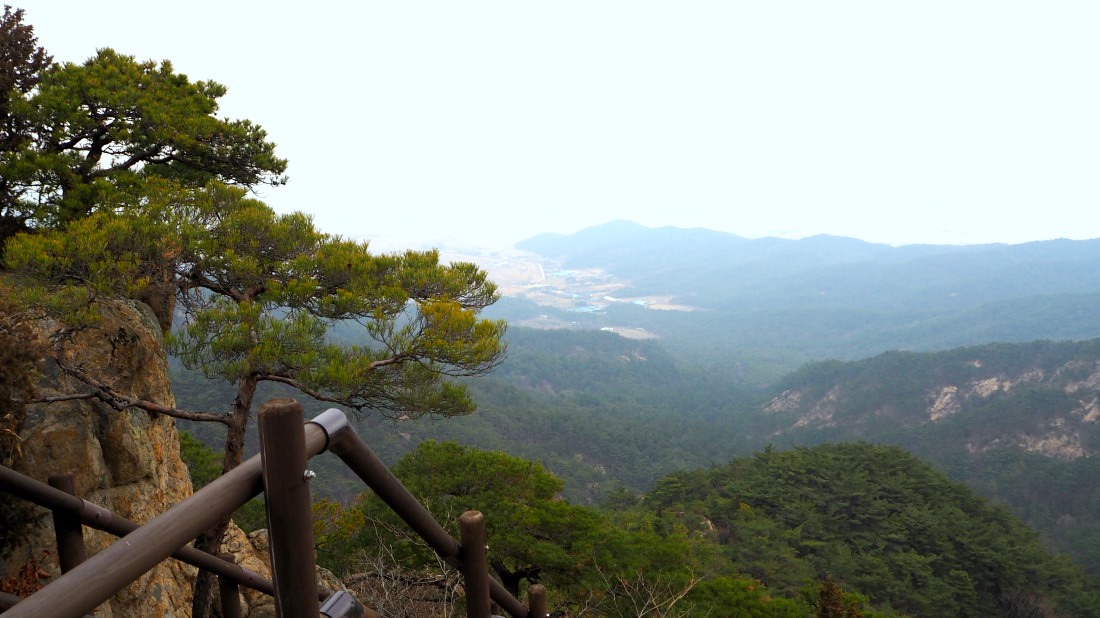 A panorama from the peak of Chilbulam Hermitage
A panorama from the peak of Chilbulam Hermitagesome facilities
The facilities are basic, as you know that Buddhists are living ascetic lives. As a visitor, or as a passerby hiker, you can get the following…
- Free entrance
- Fresh Water
- Washroom
- Overnight Stay (call them ahead but for a reasonable fee)
- Free Tea
- Fresh Air
I believe that camping around is NOT allowed. Also, nobody is allowed to smoke, build a fire, and cut trees or catch animals and hurt plants.
Traveling to Chilbulam Hermitage
I came taking a bus #11 from Bulguksa Temple, but I got off one stop before the right stop—Tongiljeon (통일전) Bus Stop. Let me suggest the following…
From Gyeongju City
Take either bus #10 or #11 from across the Gyeongju Intercity Bus Terminal. I think that bus #11 gets there faster than the other one...
- Then get off at Tongiljeon Bus Stop (a corner bus stop). You will know it is your stop because of the wide parking area you will see ahead.
- Then cross that parking area and pass through the famous Seolchuji Pond and a temple area.
- Then continue as you will be guided by signposts until you reach another sign that says ‘Chilbulam Trail,’ unfortunately, in Korean only!
The shortest bus travel should only take around 15 minutes while the other is about 45 minutes.
If you are with friends or a group (of three), you can take a taxi and pay the same fare you’ll pay for a bus. Tell the taxi driver to bring you to Namsan Chilbulam.
Use your smartphone to navigate your way, if you want to (who doesn’t have one!).
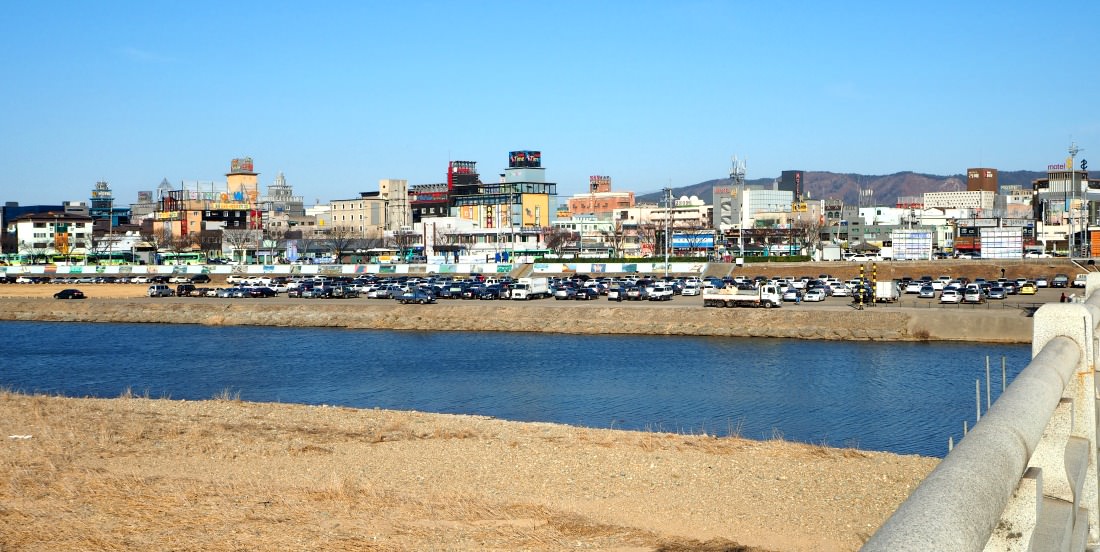 Gyeongju City
Gyeongju CityOther Interesting Sites Nearby
You can do a lot when traveling Gyeongju even in just one day. If Chilbulam Hermitage is your first destination, and if you started in the morning, you could still travel to other places in Gyeongju City or nearby places.
The most popular place close to Chilbulam Hermitage is UNESCO World Heritage enlisted Bulguksa Temple. Then you can continue to Seokguram Grotto to fill up your day’s tour before going back to the city.
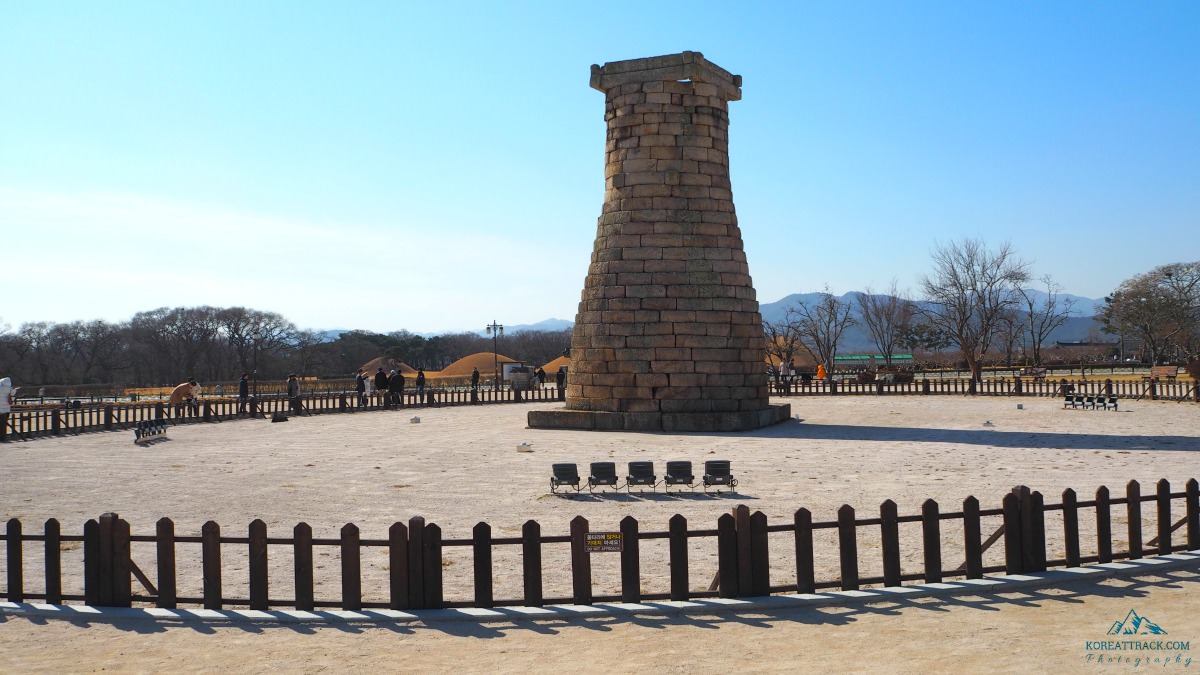 Cheomseongdae Astronomical Observatory
Cheomseongdae Astronomical ObservatoryAlternatively, you can proceed with your mountain hiking by crossing over the mountain peak of Namsan to get to the other side. There, you will also see more temples, pagodas, stone-carved Buddha and Bodhisattva images, among other interesting sites and places.
However, if you want to go back to Gyeongju City and explore the attractions there, you should not miss the following sites…
- Cheomseongdae Astronomical Observatory
- Cheonmachong Tomb & Daereungwon Ancient Tombs
- Gyerim Forest
- King Naemul Tomb
- Gyeongjuhanggyo (Confucian School)
- Woljeonggyo Bridge
- Gyochon Traditional Korean Village
- Ancient Tombs
- King Muyeol Tomb
- General Yu-sin Tomb
Yes, there are many places you can cover if you have time.
Hope you have a great and pleasant journey.
Thanks for visiting this website.
- Home
- Temples in South Korea
- Chilbulam Seven Buddhas Hermitage
Get Exciting Activities
Book one of our exciting activities today to experience the thrill of a lifetime! Take advantage of this opportunity and secure your spot in advance.
Hotel Map Guide
Find your affordable, accessible, and comfortable hotel in Seoul at Agoda.Com. See the hotel map below...
Hotel Booking Guide
Find affordable and amazing hotels on Agoda.com using the search box below. Book now to enjoy great discounts and save!

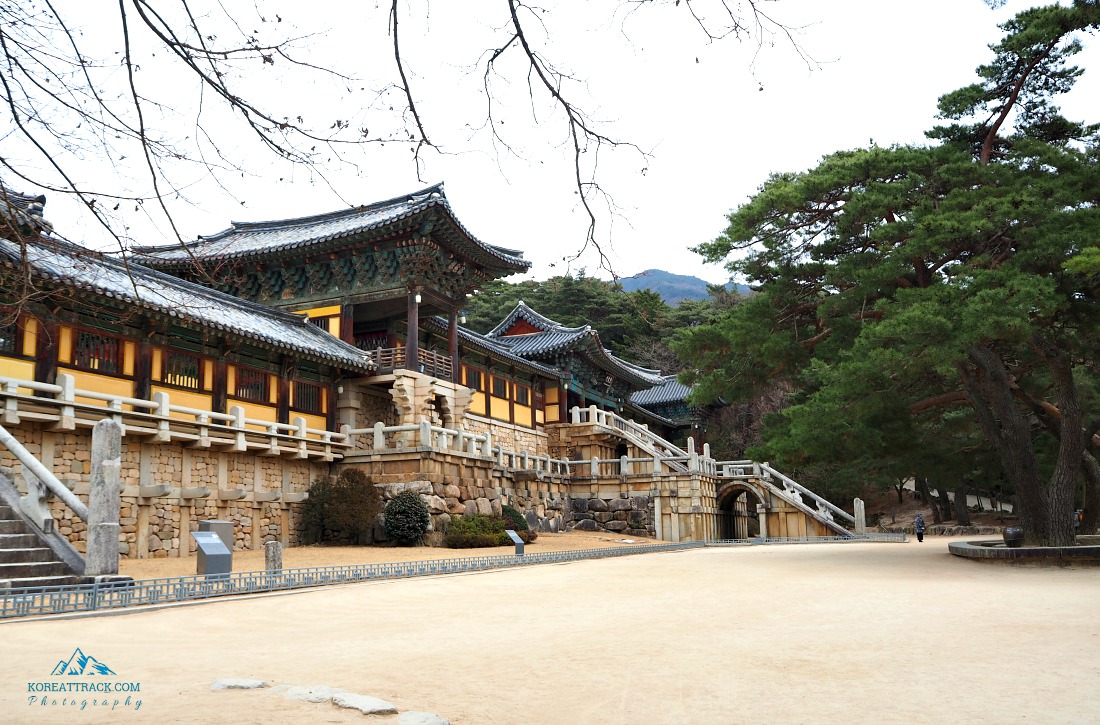
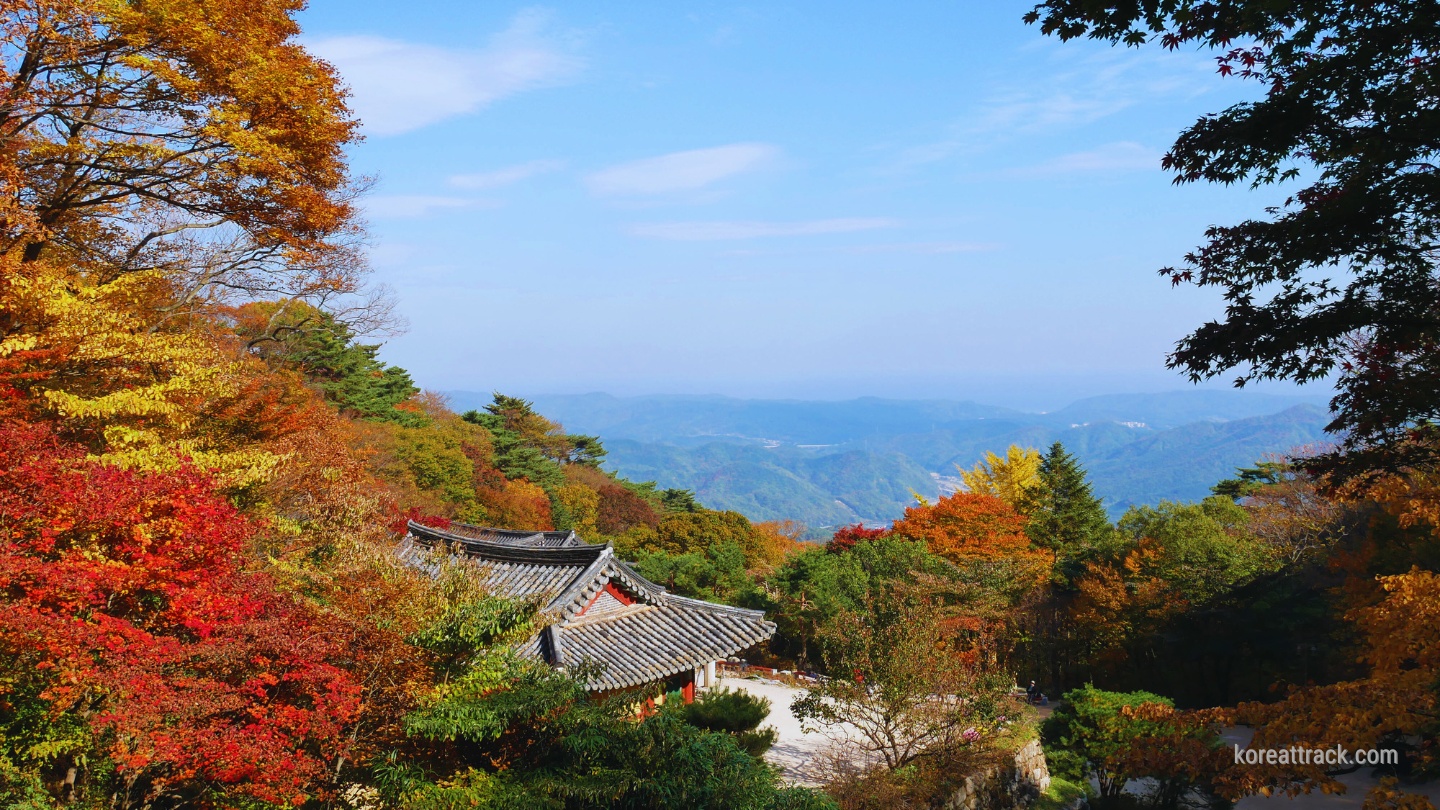




New! Comments
What do you think about this page? Leave me a comment in the box below.